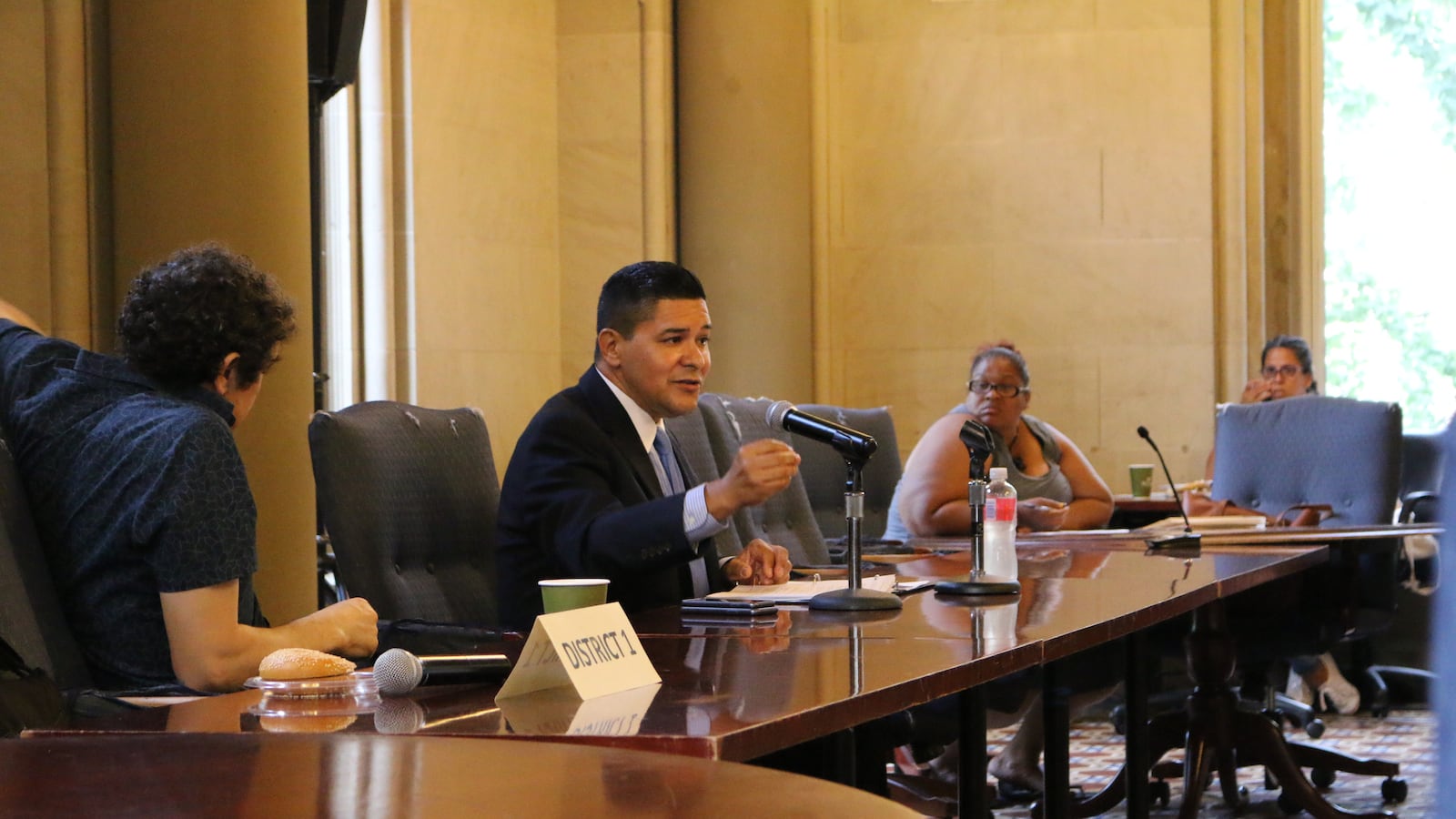A parent advisory group charged with offering feedback to New York City’s schools chancellor is going to be missing a key audience member in the foreseeable future: the chancellor himself.
Chancellor Richard Carranza’s decision to stop attending the meetings of his own parent advisory group is a direct response to a bitter internal battle among the parents who are supposed to offer him counsel. At issue: accusations that an election held last month to determine the group’s leadership was illegitimate.
Those grievances spilled into public view Thursday morning during a contentious, three-hour meeting of the Chancellor’s Parent Advisory Council, the little-known group of parent leaders at the center of the controversy. Some members in attendance expressed frustration that the group’s bylaws for holding elections were not followed.
Complicating matters, there is no apparent procedure for addressing such a dispute. The council’s members have accused the education department of overstepping its authority by trying to render a decision about the election’s legitimacy, and voted to embark on their own investigation.
“It’s a complete waste of time having to go through this,” said Marco Battistella, an executive board member for the past three years from Manhattan’s District 1. “But if somebody has a complaint, that complaint has to be looked at.”
Over bagels and other snacks at the education department’s stately Lower Manhattan headquarters, CPAC’s monthly meetings typically include a chance for its 38 members — parent association leaders from throughout the city — to share concerns and ask questions of the chancellor, hear from department officials about new initiatives, and discuss other issues bubbling up in their communities.
Last month, the group was scheduled to hold elections for a new slate of executive board members. But at least two former executive board members, who continue to serve on CPAC, have raised questions about the process and filed “grievances” alleging it was unfair.
One of those members, Sheree Gibson, who had served as the group’s co-chair, alleged in a complaint sent to Carranza more than two dozen problems with the process, including that proper notice was not given beforehand, and that there were not adequate checks on whether each voter was eligible to cast a ballot. Other parents disputed the allegations cited in the complaint. (Unlike most parent associations, the rules governing CPAC are largely not spelled out in the education department’s regulations and are left to the group’s own bylaws.)
“There were a lot of different things that were done wrong in the process of electing the leadership,” Gibson said during the Thursday meeting, “and it’s really important that we’re doing the process right.”
Still, the stakes of the fight appear relatively low: Even though Gibson lost her position on the executive board, she will continue as a member of CPAC. She noted that she doesn’t have any specific complaints about the parents who have now assumed leadership positions on the executive board and was largely pressing the issue as a matter of fairness.
Some parent leaders dismissed the complaints as a distraction.
“Do we want to make schools better or do we want to fight?” said Martha Kessler, one of the newly elected executive board members, during the meeting. “We’re a team and we’re a council and we need to remember that.”
Adding to the discord, education department officials have waded into the controversy, pledging to settle the matter themselves.
In an email sent to CPAC members Wednesday night that was obtained by Chalkbeat, a deputy chancellor wrote that the department had received four complaints and unsuccessfully tried to get parents to come to a resolution. The message added that CPAC “did not conduct a full and fair investigation of the grievances.”
As a result, the Division of Family and Community Engagement “will be forwarding all grievances regarding the CPAC election to the DOE’s Office of General Counsel for investigation and final determination,” wrote Adrienne Austin, an acting deputy chancellor who replaced Hydra Mendoza earlier this fall. “As such, the Chancellor will suspend his appearance at the CPAC meetings until these grievances are investigated and resolved.”
It’s not clear that the education department has any formal authority over the advisory group and some parents said the move infringes on the group’s independence. At the Thursday meeting, Austin suggested it was a “conflict of interest” for CPAC to investigate whether its own elections were conducted fairly.
“When Hydra was here things had really changed in how [the DOE] was handling parents and now it feels like it has jumped back,” Battistella said. “There is no regulation that makes them responsible” for the election dispute, he added.
In response, the parent group nearly unanimously approved a resolution creating their own investigation of the election complaints Thursday, excluding any current or former executive board members and those who filed the grievances.
In the meantime, some parents said they were angry that the chancellor would not be attending meetings until the dispute is resolved and passed a resolution demanding Carranza attend.
“I come [because] I’m interested in discussing things with the chancellor; we are the voice of the parents,” said Leonard Silverman, a CPAC rep for Manhattan’s District 2. “That to me is offensive and that requires an apology as far as I’m concerned.”
Education department spokesperson Miranda Barbot said that Carranza is “eager to have this important parent advisory group back to the important work of partnering with him to serve our 1.1 million children. Every day internal politics take precedent is a day the group is unable to advance the children’s agenda.”
After hours of arguing, the meeting wound down with a previously scheduled presentation for new members on parliamentary procedure and Robert’s Rules of Order. But by that point, several members had already left the room to talk amongst themselves and department officials about the controversy roiling the advisory group.


